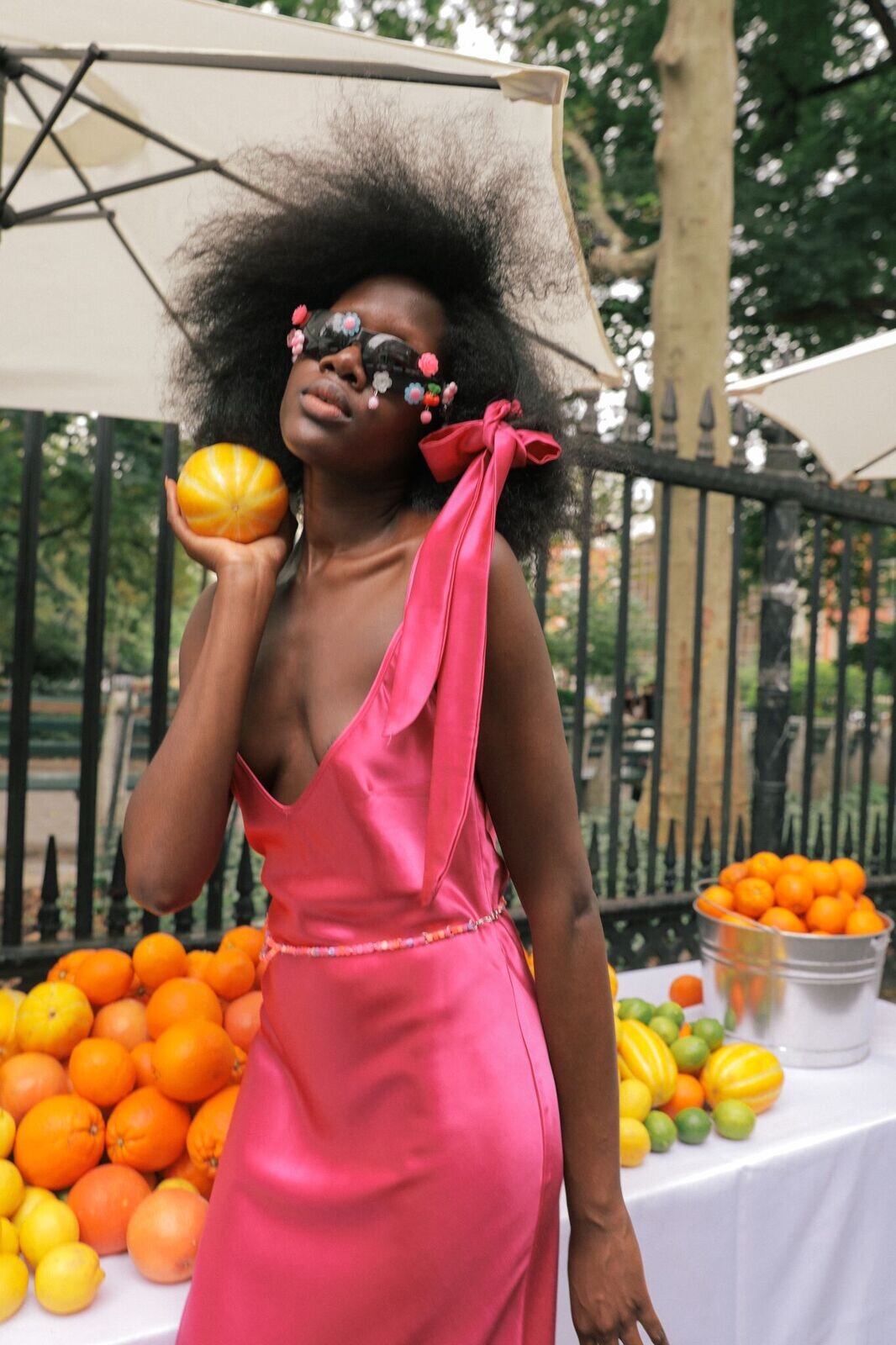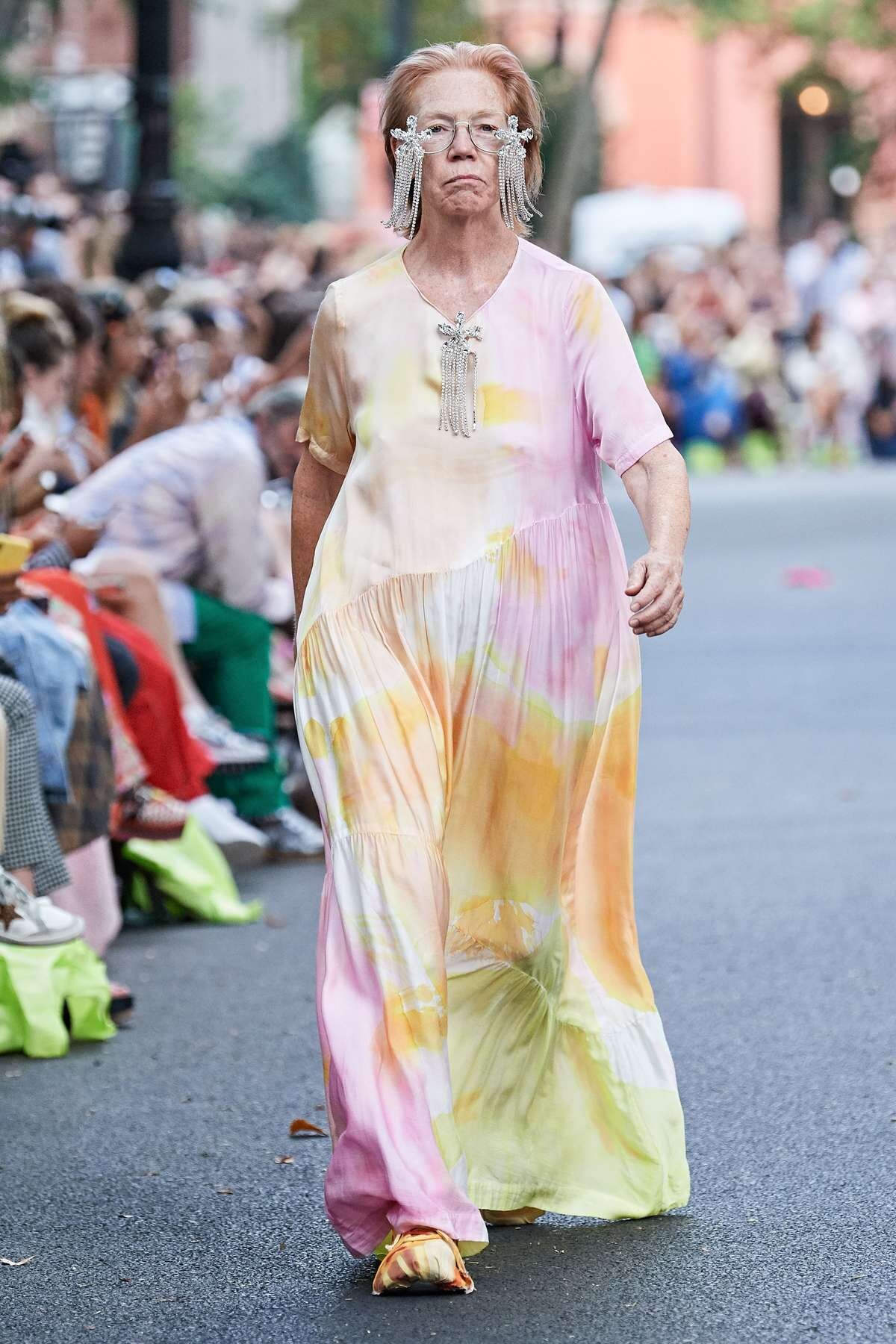Collina Strada S/S 20
Along for The Ride
Words by Danielle Pender
Collina Strada’s journey to a sustainable future
Collina Strada isn’t a label that’s interested in following trends. Instead, each collection is a mini-movement that reflects some of the large existential questions we’re all wading through at the minute—whether that’s self-love, self-preservation or community healing. The New York label is still relatively young but as they grow their founder and head designer, Hillary Taymour has her vision set on what she wants Collina Strada’s sustainable and transparent future to look like.
Riposte: What was your aim when you first started Collina Strada?
Hillary Taymour: I just wanted to use Collina Strada as a creative platform. It has thankfully turned out to be so much more and it’s extremely fulfilling in regards to using it as a voice.
R For your latest collection you used a lot of upcycled materials, how did this influence the design process? What comes first the materials or the designs?
HT It’s a little bit of both. It’s kind of like the chicken and the egg, but most of the time the materials come first.
Collina Strada S/S 20
From the Collina Strada S/S 20 show
R Your shows reflect real inclusivity rather than just paying lip service to a corporate diversity strategy. How do you go about casting your shows?
HT I feature a lot of friends, family and people in my community. Sometimes I see people on the street and I love their look so I’ll ask them to be in the shows. It truly depends; I always try to make sure it feels natural and not forced in any way. I never let anyone walk in something they don’t feel comfortable wearing. I think that is why my fittings are so long! At the end, some models are like, “I tried on the whole collection!” But I just want to see what makes them feel good and look for what reads the most authentic in my eyes.
R Your collections deal with some existential ideas. How do you approach the overall concepts for each collection?
HT It’s very instinctive. I explore whatever issues I want to address, what I see in my everyday life, what I feel like talking about. I want to use Collina Strada as a voice to the public and consumers and to start a dialogue on how we can all be the best version of ourselves.
Collina Strada S/S 20
R You’re really honest that your business isn’t 100% sustainable. This honesty is critical—to admit that you’re not perfect but that you’re trying.
HT Sustainability is a journey, not a destination. Every day we have new facts on how recycled fabrics might not be the best for the planet, after all. Apparently, fabrics made from recycled water bottles are the worst as they release millions of microplastics into the ocean every time you wash a garment. We are still learning how to clean up the mess we have created, and it’s ok that we don’t have all of the answers straight away. You can’t decide tomorrow, “I’m going to be 100% sustainable from now on,” that’s not realistic. My goal with Collina Strada is not to shame anyone. I just want to create a safe, fun space where we can talk about collectively doing better.
“Sustainability is a journey, not a destination.”
R Your latest show at New York Fashion Week felt like a significant political statement, and it also made viewers ask questions such as, “How can I help?” Do you think we’ll see more of this approach across the fashion industry?
HT I truly hope so. It’s so important in fashion right now not to just greenwash and to authentically try to change. The problem is larger corporations are slapping sustainable labels on everything, and there is no one regulating it. The consumer is being lied to and people can’t tell the difference. I think the only way for true change to happen is through legislation—to make laws that address the inner workings of larger corporations. They need to regulate their new plastic usage, and governments should charge huge fines when companies surpass their limits. It would help make legislative changes to get us off a fossil fuel-dependent system—that’s the way I’d like to see it go. The Green New Deal is a great step in the right direction with its plan to decarbonize the industry.
Collina Strada S/S 20
Collina Strada S/S 20
R What are your thoughts on scaling your business? Do you want to? How would this happen sustainably?
HT In this climate crisis I am struggling to figure out how to be as responsible and transparent as possible. I’m learning daily about how to build better business practices and design with consciousness. It’s possible to scale sustainability but it will be hard. I truly hope Collina Strada can scale in an organic way that will help it actually make money and be able to hire the right people to internally keep it on track sustainably.
In practical terms, I want to create sustainable organic fabrics from recycled organic fibres. I would love to be able to create my own fabrics for myself and other brands that are clean and green. If we can start creating a surplus of fabric we won’t have any caps on production and can start to scale on a larger level.
I also want to create passports for each garment so you can see where the fabric was produced and how far the garment has travelled before it reaches the consumer's hands.
R Are there any other labels who are the next level up from Collina Strada in terms of scale that you admire?
Mara Hoffman!
Collina Strada S/S 20
Collina Strada S/S 20
Collina Strada S/S 20
Collina Strada S/S 20
Collina Strada S/S 20











